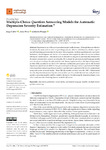Mostrar o rexistro simple do ítem
Multiple-Choice Question Answering Models for Automatic Depression Severity Estimation
| dc.contributor.author | Gabín, Jorge | |
| dc.contributor.author | Pérez, Anxo | |
| dc.contributor.author | Parapar, Javier | |
| dc.date.accessioned | 2022-01-12T19:37:09Z | |
| dc.date.available | 2022-01-12T19:37:09Z | |
| dc.date.issued | 2021 | |
| dc.identifier.citation | Gabín, J.; Pérez, A.; Parapar, J. Multiple-Choice Question Answering Models for Automatic Depression Severity Estimation. Eng. Proc. 2021, 7, 23. https://doi.org/10.3390/engproc2021007023 | es_ES |
| dc.identifier.uri | http://hdl.handle.net/2183/29372 | |
| dc.description | Presented at the 4th XoveTIC Conference, A Coruña, Spain, 7–8 October 2021. | es_ES |
| dc.description.abstract | [Abstract] Depression is one of the most prevalent mental health diseases. Although there are effective treatments, the main problem relies on providing early and effective risk detection. Medical experts use self-reporting questionnaires to elaborate their diagnosis, but these questionnaires have some limitations. Social stigmas and the lack of awareness often negatively affect the success of these self-report questionnaires. This article aims to describe techniques to automatically estimate the depression severity from users on social media. We explored the use of pre-trained language models over the subject’s writings. We addressed the task “Measuring the Severity of the Signs of Depression” of eRisk 2020, an initiative in the CLEF Conference. In this task, participants have to fill the Beck Depression Questionnaire (BDI-II). Our proposal explores the application of pre-trained Multiple-Choice Question Answering (MCQA) models to predict user’s answers to the BDI-II questionnaire using their posts on social media. These MCQA models are built over the BERT (Bidirectional Encoder Representations from Transformers) architecture. Our results showed that multiple-choice question answering models could be a suitable alternative for estimating the depression degree, even when small amounts of training data are available (20 users). | es_ES |
| dc.description.sponsorship | This work was supported by projects RTI2018-093336-B-C22 (MCIU & ERDF), GPC ED431B 2019/03 (Xunta de Galicia & ERDF) and CITIC, which is financial supported by Consellería de Educación, Universidade e Formación Profesional of the Xunta de Galicia through the ERDF (80%) and Secretaría Xeral de Universidades (20%), (Ref ED431G 2019/01). | es_ES |
| dc.description.sponsorship | Xunta de Galicia; ED431B 2019/03 | es_ES |
| dc.description.sponsorship | Xunta de Galicia; ED431G 2019/01 | es_ES |
| dc.language.iso | eng | es_ES |
| dc.publisher | MDPI | es_ES |
| dc.relation.uri | https://doi.org/10.3390/engproc2021007023 | es_ES |
| dc.rights | Atribución 3.0 España | es_ES |
| dc.rights.uri | http://creativecommons.org/licenses/by/3.0/es/ | * |
| dc.subject | Depression prediction | es_ES |
| dc.subject | Social media | es_ES |
| dc.subject | Pre-trained language models | es_ES |
| dc.subject | Multiple-choice question answering | es_ES |
| dc.title | Multiple-Choice Question Answering Models for Automatic Depression Severity Estimation | es_ES |
| dc.type | conference output | es_ES |
| dc.rights.accessRights | open access | es_ES |
| UDC.journalTitle | Engineering Proceedings | es_ES |
| UDC.volume | 7 | es_ES |
| UDC.issue | 1 | es_ES |
| UDC.startPage | 23 | es_ES |
| dc.identifier.doi | 10.3390/engproc2021007023 | |
| UDC.coleccion | Investigación | es_ES |
| UDC.departamento | Ciencias da Computación e Tecnoloxías da Información | es_ES |
| UDC.grupoInv | Information Retrieval Lab (IRlab) | es_ES |
Ficheiros no ítem
Este ítem aparece na(s) seguinte(s) colección(s)
-
Investigación (FIC) [1685]






